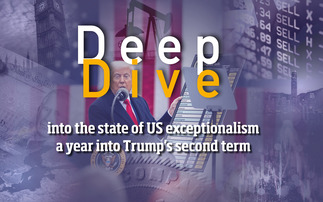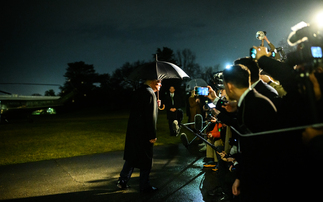In the first of a special three-part Big Question, fund managers give their views on whether President Trump can deliver on his campaign promises, and what this will mean for markets.
Steven Andrew, manager of the M&G Episode Income fund
Caution required
Market behaviour in the past six months has been more about a removal of the deep pessimism that had set in by the summer of 2016, rather than a real increase in optimism about growth.
While President Trump has had a clear effect, some of the most significant shifts in markets began well before his victory. President Trump provides a convenient rationalisation but is not the be all and end all here.
Since the middle of 2016, data has improved and the reliance on monetary policy has been challenged around the world, of which President Trump can be a symptom. Scepticism remains but there is now talk of the possibility of ‘reflation'.
As a result, the relative attractiveness of equities versus bonds is now less compelling than it was. For equities to continue to do well there is a need for earnings delivery, regardless of whether they are Trump-related or not. Caution may therefore be required.
However, from a multi-year perspective, investors still seem well compensated for risk in equity markets while the recent government bond sell-off has provided an opportunity to diversify portfolios.
Craig Veysey, head of fixed income at Sanlam Private Wealth
Bond yield volatility
After the US Treasury 10-year yield peaked at 2.6% in mid-December, bond yields have begun retracing some of the volatility seen post the US election shock.
For us, the best case economic scenario of the Trumpflation theme is already priced in, particularly with investors having positioned themselves accordingly by becoming heavily underweight treasuries in recent weeks.
Higher treasury yields from here will require a much stronger burden of proof regarding a Trump presidency's capability to counteract opposing structural forces weighing on long-term economic growth and inflation, both in the US and globally.
As we saw in 2016, bond yields can become somewhat divorced from fundamentals in any case if some unanticipated financial market or economic shocks arise.
Whether it is worries over China, Brexit, European elections, or simply a hefty dose of realism over the new President's abilities, we think there is plenty of scope for downside surprises in the coming months.
Volatility in bond yields is likely again in 2017, but with a balance of risks that points firmly towards much lower US treasury yields.
Bruce Jenkyn-Jones, co-head of listed equities at Impax Asset Management
Environmental opportunities
We believe many investors' kneejerk reactions to Donald Trump's election victory were overly pessimistic on the outlook for environmental markets. Trump campaigned as a pro-coal, climate change sceptic but, despite these political headwinds, we see powerful economic forces at work.
The underlying drivers advancing many environmental technologies are increasingly beyond most regulatory intervention, and consumers are progressively seeking more sustainable products and services.
We expect to see some slowdown in US environmental policy momentum, but the US has already ratified the Paris Climate Agreement and it is unlikely to be cancelled. President Trump has also stated a strong commitment to infrastructure spending across water, transport and real estate.
While markets are getting ahead of themselves for prospects on infrastructure spending in the US, we expect to see higher spending on related components, services and other infrastructure hardware over the longer term.
Furthermore, the incoming administration's support for domestic energy should give rise to investment opportunities in hazardous waste management, water treatment and environmental testing.













